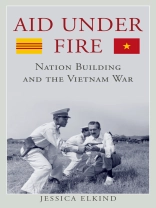In the aftermath of World War II, as longstanding empires collapsed and former colonies struggled for independence, the United States employed new diplomatic tools to counter unprecedented challenges to its interests across the globe. Among the most important new foreign policy strategies was development assistance—the attempt to strengthen alliances by providing technology, financial aid, and administrators to fledgling states in order to disseminate and inculcate American values and practices in local populations. While the US implemented development programs in several nations, nowhere were these policies more significant than in Vietnam.
In Aid Under Fire, Jessica Elkind examines US nation-building efforts in the fledgling South Vietnamese state during the decade preceding the full-scale ground war. Based on American and Vietnamese archival sources as well as on interviews with numerous aid workers, this study vividly demonstrates how civilians from the official US aid agency as well as several nongovernmental organizations implemented nearly every component of nonmilitary assistance given to South Vietnam during this period, including public and police administration, agricultural development, education, and public health. However, despite the sincerity of American efforts, most Vietnamese citizens understood US-sponsored programs to be little more than a continuation of previous attempts by foreign powers to dominate their homeland.
Elkind convincingly argues that, instead of reexamining their core assumptions or altering their approach as the violence in the region escalated, US policymakers and aid workers only strengthened their commitment to nation building, increasingly modifying their development goals to support counterinsurgency efforts. Aid Under Fire highlights the important role played by nonstate actors in advancing US policies and reveals in stark terms the limits of American power and influence during the period widely considered to be the apex of US supremacy in the world.
Tabla de materias
Introduction: Building South Vietnam
‘The Virgin Mary Is Going South’: Refugee Resettlement in South Vietnam
Civil Servants and Cold Warriors: Technical Assistance in Public Administration
Sowing the Seeds of Discontent: American Agricultural Development Programs in South Vietnam
Policing the Insurgency: Police Administration and Internal Security in South Vietnam
Teaching Loyalty: Educational Development and the Strategic Hamlet Program
Conclusion: ‘Ears of Stone’
Sobre el autor
Jessica Elkind is associate professor of history at San Francisco State University.












